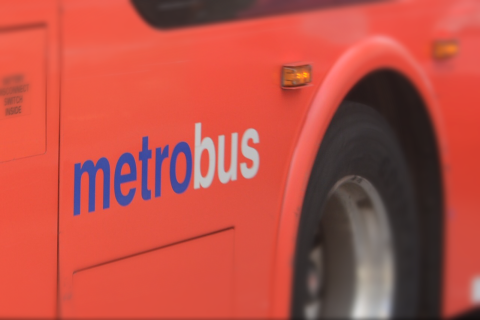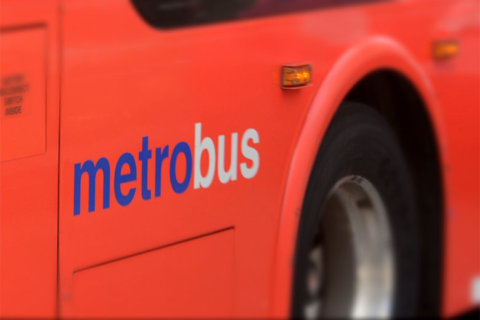Thousands of Metrobus riders — mainly in Fairfax County, Virginia — are now in their third week with no service or significantly reduced service, and Metro expects the cuts to remain for the duration of a strike at a privatized bus garage.
“Any contractor … it’s not anticipated if all the employees left that they would replace all that,” Metro General Manager Paul Wiedefeld said.
Metro and union officials agree the strike is about more than just a contract with Transdev at the Cinder Bed Road garage, and instead extends to concerns about privatization and pay cuts at other transit systems in Northern Virginia and beyond.
“It’s a bigger context,” Wiedefeld said.
Union leaders said the issues leading up to the strike show the pitfalls of contracting out operations with the sole intent of saving money.
Wiedefeld still sees contracting as crucial to keeping Metro’s budget in line.
“Fairfax Connector’s been run by the private sector for a long time, and there’s lots of examples of things that are run by private sector that are good. Doesn’t mean it’s always good,” Wiedefeld said.
Fairfax Connector drivers plan a strike authorization vote Saturday ahead of the expiration at the end of this month of their separate contract with Transdev.
A strike against Fairfax County’s local bus system would take away the few alternatives riders have during the Cinder Bed strike and cut service for thousands more commuters across a broader area.
The terms of new deals for workers at Fairfax Connector and at Cinder Bed Road will set a precedent for other transit contracts across the region.
The Cinder Bed Road workers also face their own deadline soon where federal law would allow an effort to decertify the union if no collective bargaining agreement has been reached.
Amalgamated Transit Union Local 689 President Raymond Jackson is confident the workers will stick with the union.
Jackson was with Wiedefeld Friday at Metro headquarters for a regular monthly sit-down.
A Metro source familiar with overall options suggested that one possible route to resolving the strike at the Cinder Bed Road garage in Lorton, Virginia, could be Metro agreeing not to contract out operations on the Silver Line extension into Loudoun County, if the union agrees to significantly reduce retirement benefits for some or all newly hired workers.
The union has not agreed to cut pensions or other benefits, and stood firmly behind maintaining pay structures during the last round of collective bargaining, citing Metro’s own failure to contribute its required share to the pension plan at times in the past.
Friday morning’s discussion between Jackson and Wiedefeld did not directly focus on the strike, but did include general conversations about labor-management issues, the Cinder Bed garage and Silver Line Phase 2 contracting, Jackson said.
“If we can work out something on that, fine. … That’s a normal conversation for him and I,” Jackson said.
For now, things are “status quo” at Cinder Bed Road, Jackson said, with picket lines continuing.
The discussions between Wiedefeld and Jackson are meant to prevent smaller issues from ballooning into bigger ones ahead of the expiration next summer of Local 689’s main contract with Metro that covers thousands of workers, such as bus and train operators.
“If we keep going down the road we’re going down, this whole region’s going to pay for it, and I’m hoping that we don’t have to go that way,” Jackson said.
Jackson is also less than optimistic that the union and Transdev will reach a deal on wages and benefits for the striking Cinder Bed workers any time soon.
“Either give 689 back all of the work, or bring Transdev to the table,” he urged.
There are no additional negotiating sessions currently scheduled on a Cinder Bed contract, the union said.
Wiedefeld said Thursday that Metro will continue to stay out of the strike and related labor talks.
“It’s a contract, for one thing,” Wiedefeld said. “We pick a lot of contractors, and they have labor-management issues that they deal with as well.”
He does support Transdev’s request for mediation in the bargaining dispute, and hopes talks continue in the meantime.
Still, thousands of Metrobus riders are into their third week of needing to find other ways around.
“We do what we can do, again, contractually, so we will continue to do that, but the key here is they’ve got to reach agreement,” Wiedefeld said.
There have apparently been no penalties against Transdev during the strike, suggesting that the limited service only on the Richmond Highway Express (REX), 29K and 29N routes meets the strike contingency plan provided to Metro as part of the contract.
Transdev is not violating the plan, Wiedefeld said.
Routes 17B, 17G, 17H, 17K, 17L, 17M, 18G, 18H, 18J, 18P, 29C, 29G, 29W, S80 and S91 have been canceled during the strike.
Routes 29K, 29N and REX have been operating on Saturday schedules.
It is not clear what portion of the contract value Metro pays Transdev during the reduced service.
Metro will not offer any additional buses until the strike is resolved, Wiedefeld said.
“I think they’ve both made their points, right? Both with a strike and with people walking away from the table. I think it’s time for them to sit down at the table and get this done,” he said.
Metro’s Riders Advisory Council urged the agency to take a more active role in getting the strike resolved and to more clearly communicate operations plans with riders.
If the issue were between Metro and the union, rather than the union and a private contractor, it would instead have gone to binding arbitration.







